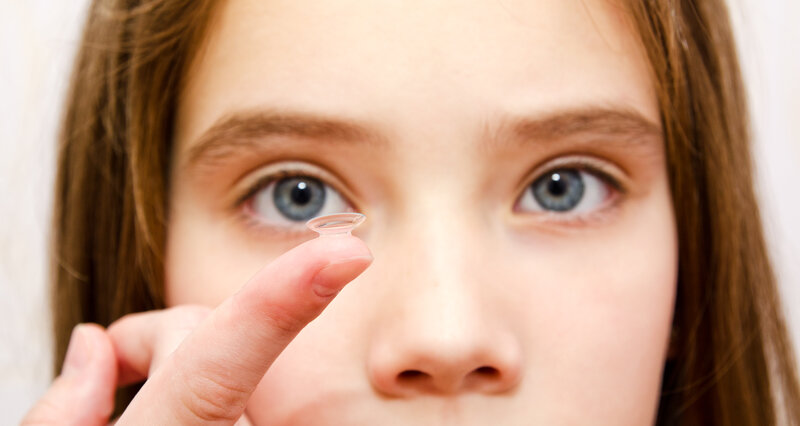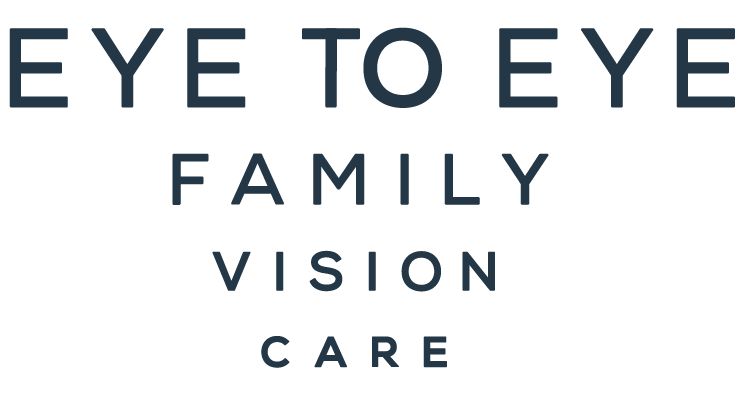Should I Let My Child Wear Contact Lenses?

Is your child tired of wearing glasses and asking for contacts? Or has the normal attack of vanity made your youngling pine for the cooler, lens-free look of contact lenses? We understand.
We usually don’t recommend contacts for elementary school children and can discuss the pros and cons of letting your middle school or junior high student get contacts. By high school, most (but not all!) teens can honor the “rules and hygiene requirements” associated with contact lenses - but every situation is different.
5 Things To Consider Before Letting A Child Wear Contact Lenses
Kids, tweens, and teens want to wear contacts for the same reasons adults do. But, depending on your child’s age and vision health, it’s not always the best idea. Here are some factors we discuss when parents ask us about kids and contacts.
How old are they?
Most eye care professionals recommend sticking to eyeglasses until a child is at least 12 years old. Most younger children simply don’t have the discipline and ability to take care of contact lenses as they should, which puts them at risk.
It may seem hard to believe, but according to the FDA’s emergency room and urgent care data from around the nation, “...according to a study published in Pediatrics, about 13,500 (or one-fourth) of the roughly more than 70,000 children who go to the emergency room each year for injuries and complications from medical devices are related to contact lenses.”
Most adults don’t think about the risks associated with contact lenses because they clean, store, and wear them properly. This is not necessarily the case for younger teens and children, which puts them at risk for some of the most common contact lens complications: eye infections and surface abrasions (scratched eye membranes and possibly the cornea).
What are their hygiene habits like at home?
Your child may promise you up and down that they’ll take care of their contacts. However, our experience is that a child’s at-home hygiene routine best predicts whether they’re ready for contact lenses. So, if your child is 12+ and they are great about:
- Taking baths/showers daily.
- Hanging the towel back on the rack.
- Putting their clothes in the laundry hamper.
- Brushing and flossing their teeth properly without being told to.
- Keep the bathroom surfaces clean and tidy.
- Put away their hair products/makeup/other health/beauty products they use to get ready in the morning.
- Etc.
…they may be ready to experiment with contact lenses. Contact lenses are not a good idea if they don’t do those things on their own and with regularity. Their dedication to personal hygiene, including bathroom surfaces, proves they have what it takes to take good care of their contact lenses. Good contact hygiene is the best way to prevent eye infections.
If they lack attention to these details, it’s a perfect way to tell them, “Hey! We hear you want contacts, and we’re open to that. However, you must prove to us that you can take good care of them to avoid losing them, ruining them, or putting yourself at risk for eye infections. We'll re-open the discussion when you show us you can keep yourself and your bathroom maintained for at least 90 days.”
Do they suffer from allergies?
We recommend skipping contacts for now if your child suffers from seasonal or environmental allergies. Contact lenses trap allergens between the lenses and the eyes. So this can cause a child with mild-to-moderate allergies to have intolerably irritated eyes during allergy flare-ups. Many of our adult patients skip their contacts and wear glasses 100% of the time during peak allergy season or when they're around a powerful allergen (like dogs, cats, horses, etc.).
Most kids grow out of the worst of seasonal allergies. In addition to more robust immune systems, older kids tend to be better about things like washing their hands, not touching their face/eyes with their hands as often as littles do, and not rubbing their eyes as often. All of these things are not good for anyone, let alone children with contacts. Once their allergies are under control and they’ve shown they can care for their contacts, we can discuss the next steps.
How much time do they spend on screens?
Another thing worth mentioning is that contacts and screen time are a terrible combination. Even without contacts, screen use strains all eyes to a certain degree. This is the result of the light emanating from the screen and the fact that we don’t blink as often as we’re supposed to when we stare at screens. This is why we recommend preventing eye strain by adopting the 20-20-20 rule, which also encourages healthy blinking and eye lubrication.
People who work (or spend their school day) in front of screens are more apt to experience symptoms of dry eye, and contact lenses elevate that risk. Because most young children, tweens, and teens spend their school day and recreational time in front of screens, we don’t recommend contact lens use until later when they’re better able to keep their lenses clean, commit to the 20-20-20 rule and know how to properly administer lubricating eye drops to keep dry eye at bay.
How about using a staged contact lens approach?
If your child is under 12, the answer should be no unless there is a particular circumstance. After age 12, maturity, hygiene practices, and daily routine are the best predictors of whether contact lenses will succeed - or a major pain.
In most cases, we recommend kids 12 and up use a graduated approach to contact lenses. For example, wear them for special events that only last a short time. This gives the eyes a chance to get used to them. It also prevents children from scenarios that put their contacts (and eyes) at risk, like a long day of screen use and dry, irritated eyes or contacts that fall out in P.E. and so on.
A Commitment To Healthy Contact Lens Care Is Essential For Kids
This also gives children a chance to practice good contact lens care steps with better supervision, which include:
- Never sleep with contact lenses.
- Throwing disposable contacts away after a single use.
- NEVER wash contacts with saliva or water.
- Always use proper contact lens solutions to wash them.
- Never reapply a lens that has fallen out, no matter how clean it might look.
- Never sharing or borrowing contact lenses (or makeup, or eyedrops!).
- Have a backup pair of eyeglasses in your backpack, glove compartment, etc., just in case you need them.
If your child does wear contacts to school, we recommend buying a small hard case that can store two or three backup pairs of lenses at all times, as well as a travel bottle of contact lens cleaning solution. That way, they have replacements whenever needed, minimizing the risk of reinserting dirty or irritating lenses.
Are You Wondering If Your Child Can Wear Contact Lenses?
Do you have a child desperate to ditch their glasses and wear contact lenses? Schedule an appointment at Eye to Eye Family Vision Care, and let’s talk about it.
We understand that children don’t hear the words “no” or “not yet” from their parents the way they do from other adults or objective professionals. If we don’t feel they’re ready - or you don’t want them to have contact lenses yet - we’ll help set parameters for what needs to be in place before we feel they’re ready.

